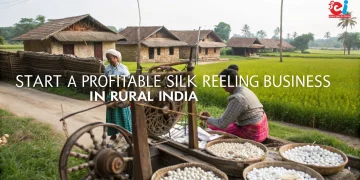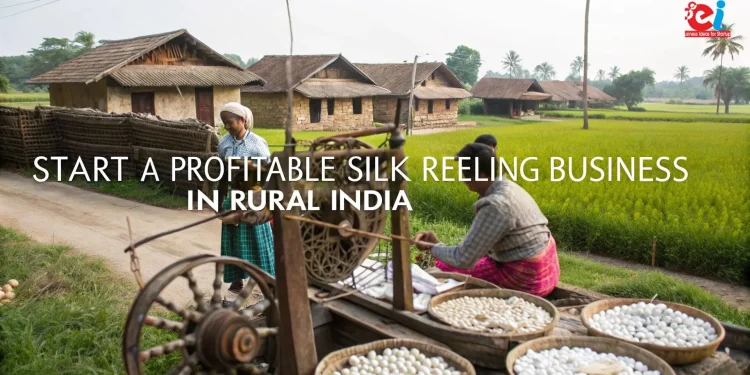Within India’s rural economy, sericulture has been a vital source of income for farmers in Karnataka, Tamil Nadu, West Bengal, Assam, and Andhra Pradesh. India has one of the world’s largest silk production capabilities which enable it to turn traditional cocoon farming into high-value, exportable textiles. At the heart of this shift is the silk reeling units which are crucial, yet under-leveraged within the business’s value chain.
Silk reeling is classified as unwinding silk filaments from cocoons, transforming raw silk yarn into more usable forms such as fabric. The precision and strength of silk is dependent on the labor-intensive activities. Although much of India’s silk reeling is manual, modernization and mechanization are paving the way for profitable and quality end products on a larger scale.
Turning silk reeling units into profitable ventures is a means of uplifting sericulture communities. In addition to creating rural employment, it helps enhance self-reliance in South Asia while strengthening competition in luxury textile markets. This article discusses the potential market of silk reeling units as impactful enterprises as well as the opportunities they create for rural entrepreneurs.
Understanding the Role of Silk Reeling Units in the Sericulture Value Chain
Sericulture begins with cultivation of mulberries, rearing of silkworms, and production of cocoons. After the cocoons are harvested, they are taken to a silk reeling unit where actual commercial transformation begins. Reeling is the procedure of soaking the cocoons in hot water to loosen the sericin (gum) and then unwinding silk filaments to produce continuous silk yarn. This raw silk is graded and either sold to weaving or dyeing units or exported directly.
There are different types of reeling systems including manual Charka reeling, Cottage basin (semi-automatic) as well as multi-end automatic reeling machines. The effectiveness and cleanliness of reeling operations dictates the quality of silk, be it Bivoltine or Multivoltine, twisted or untwisted.
In India both international and domestic markets have an increasing demand for high-quality silk. However, due to lack of access to adequate reeling facilities, a large portion of cocoons is wasted or underutilized. Entrepreneurs stand to make profits alongside these communities while supporting the population when modern silk reeling units are established near cocoon clusters.
The Business Economics Involving the Foundation of a Silk Reeling Unit
An appealing component of silk reeling is its relatively low-to-medium capital investment. A cottage basin reeling setup with 10 basins can be started with an investment of ₹8–12 lakhs, while fully automatic multi-end reeling machines (20–40 ends) may cost upwards of ₹30–50 lakhs depending on the brand, level of automation, and infrastructure requirements.
The unit must be positioned strategically within cocoon producing villages or in government-supported sericulture parks. The most important raw material for the business—cocoons—can be procured from local sericulture farmers or through government auctions held by the Central Silk Board (CSB) or State Sericulture Departments.
Every kg of fresh cocoon can produce about 100–120 g of raw silk. If the average price of raw cocoons is around ₹500–700 per kg, and the price of silk yarn is between ₹3,500 and ₹5,000 per kg depending on quality, the gross margin potential becomes very attractive. Also, the by-products are in fact sold, such as pupae and waste silk, to spun silk mills and oil extraction units, maximizing revenue with minimal waste.
Related: Challenges and Opportunities of Incorporating Natural Fibers in Textile Manufacture
Machinery and Infrastructure Requirements
The silk reeling installation is highly specialized having a dedicated clean water supply, power supply and good ventilation. The basic machinery entails the following:
- Cocoon boiling tanks or hot air drying machines
- Reeling basins equipped with thread guides with filature and reeling mechanisms
- Yarn twisting and finishing units
- Waste collection bins
- Water filtration and recycling units
In addition to the above, more sophisticated automatic units require sensors, electronic counters to record yarn length, auto thread cutting devices, and other features to minimize labor and enhance productivity. Workstation arrangement, silkworm waste disposal, hygiene practices, and all other critical aspects of workstation organization greatly impact the quality of silk produced.
Disqualification for government aid and support through programs like Silk Samagra or SFURTI is guaranteed if the machinery is not BIS certified and the plant does not meet the basic standards of quality and safety.
Government Support and Subsidies
Understanding the impact of enhancing rural income and exports through sericulture, the Government of India looks into several schemes targeted at entrepreneurs venturing into silk reeling. Under the Integrated Scheme for Development of Silk Industry (Silk Samagra), an entrepreneur is given a capital subsidy of up to 50% devoted to machinery and infrastructure expenditures.
The Khadi and Village Industries Commission along with the Ministry of MSME supports cluster-based development for silk units under SFURTI and PMEGP schemes. New units, particularly set up in rural and tribal areas, are extended loans with subsidized interest rates as well as offered technical training, market linkage support, and even export facilitation.
The Central Silk Technological Research Institute (CSTRI) along with regional sericulture centers offers training in reeling techniques, grading of cocoons, and yarn testing.
Possibilities within B2B Sales, Export & Private Labeling
Demand for silk that is ethically sourced remains on the rise and along with it comes the Private Labeling trend, an opportunity for entrepreneurs to market their silk yarns directly to designers, boutiques, and craft houses under their brand names. Origin branding such as “Assam Silk” or “Bangalore Bivoltine” along with “Tasar from Jharkhand” can especially fend more value in storytelling for niche luxury markets.
As is, India exports silk to Europe, Japan, the Middle East and the US, still offering exports of raw silk, dupion silk and specialty yarns. Silk reeling units that sustain constancy in meeting export grading standards and compliant sustainability guidelines are able to take advantage of the capped market.
Besides direct exports, B2B serves customers in power looms, handloom clusters, embroidery units and apparel manufacturing which creates a steady flow of orders independent of retail demand.
Related: Why to Start a Business of Silk Sutures Manufacturing
Challenges, Risks, and Opportunities
The silk reeling industry is promising, but entrepreneurs looking to break into the market should consider a few challenges. One of the largest challenges is the lack of skilled labor. Reeling involves some precision work such as cocoon sorting, thread joining, and yarn grading. This can be solved through partnerships with local government training initiatives and by hiring unskilled women with the opportunity to be trained.
Cocoon price fluctuations limiting margins is another challenge. Supply and price stability can be achieved with forward contracts with farmers or through direct purchase from government auctions. There are also significant wastes to be dealt with, especially with wet reeling: shedding of all but essential parts. Drainage designs, and water treatment along with bio-waste treatment systems must be included in the design of the unit.
Increased risk of power interruptions, particularly in rural areas, challenges productivity. Plans of schedulable processes along with the use of solar power systems and inverter backups can mitigate loss and downtime.
Conclusion: Weaving Prosperity Through Silk Reeling Units
The potential of silk reeling units to transform rural livelihoods, create women-led microenterprises, and produce world-class raw silk is immense. As India moves towards Atmanirbhar Bharat and sustainable development, reviving traditional sericulture practices with modern technology and business models can create lasting economic impact.
For aspiring entrepreneurs, social entrepreneurs, and NGOs working in rural development, investing in silk reeling is not just about profit—it’s about empowerment, employment, and enterprise. With the right knowledge, machinery, support, and intent, silk reeling units can weave threads of prosperity into the very fabric of rural India.
Niir Project Consultancy Services (NPCS) offers end-to-end consulting on setting up silk reeling units, including DPRs, subsidy guidance, plant layout, machinery selection, and marketing strategy to make your sericulture venture a success.


















